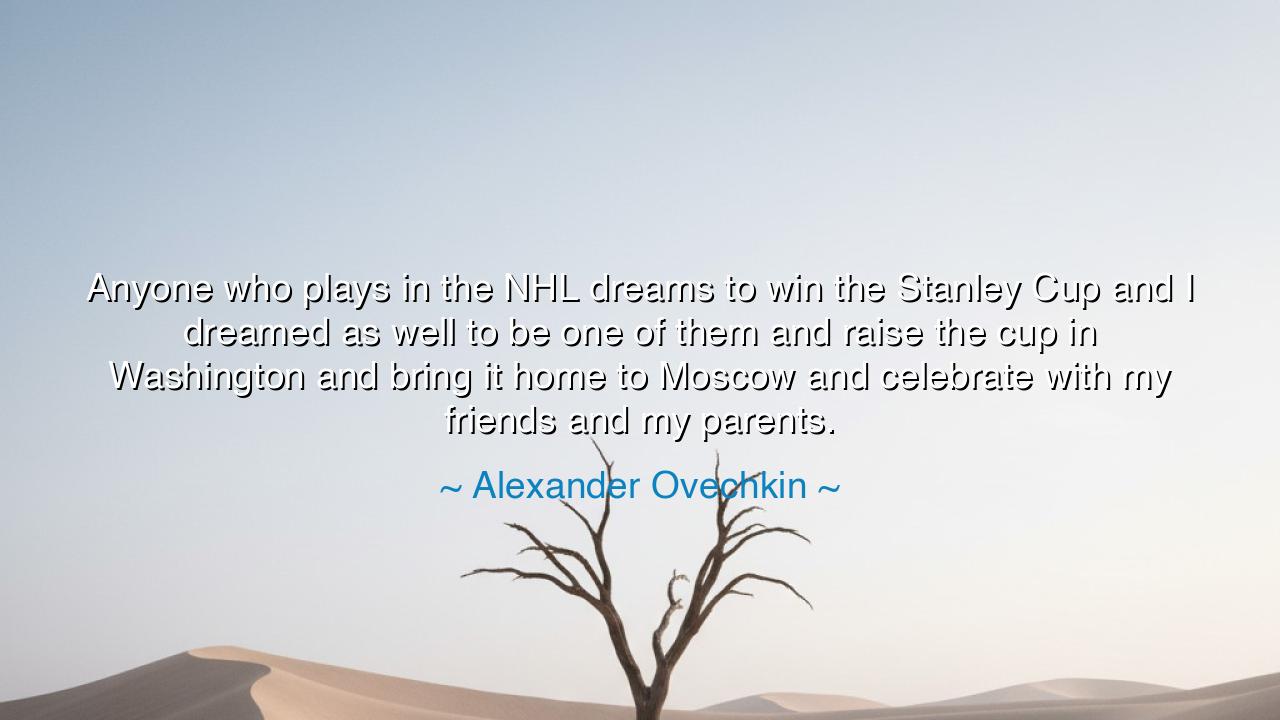
Anyone who plays in the NHL dreams to win the Stanley Cup and I
Anyone who plays in the NHL dreams to win the Stanley Cup and I dreamed as well to be one of them and raise the cup in Washington and bring it home to Moscow and celebrate with my friends and my parents.






“Anyone who plays in the NHL dreams to win the Stanley Cup and I dreamed as well to be one of them and raise the cup in Washington and bring it home to Moscow and celebrate with my friends and my parents.” Thus spoke Alexander Ovechkin, the mighty captain of the Washington Capitals — a man whose name has become legend upon the ice. In these words, he opens his heart not only as an athlete but as a dreamer, revealing the universal truth that lies within all great endeavors: that dreams, when pursued with faith and fire, can unite distant worlds — the place of struggle and the place of the soul’s origin. For Ovechkin, the Stanley Cup was not just a trophy; it was the summit of a lifelong pilgrimage, a bridge between the arena of competition and the homeland of the heart.
The origin of this quote lies in the long and winding story of Ovechkin’s journey. From his youth in Moscow, where his mother — herself an Olympic basketball champion — nurtured his passion, to his rise in the National Hockey League, his path was forged through both triumph and trial. For over a decade, he was hailed as one of the greatest players never to win the Stanley Cup, the most coveted prize in professional hockey. He carried the burden of expectation, both his own and that of his adopted city, Washington. Yet through perseverance, loyalty, and unrelenting drive, he finally lifted the Cup in 2018 — his hands trembling, his eyes ablaze with tears and joy. In that moment, his words became a testimony to the endurance of dreams, and to the love that connects the individual to both his team and his roots.
To raise the Cup is not merely to win; it is to fulfill a destiny written long before the first puck dropped. Ovechkin’s statement reveals that victory is sweetest when it is shared — when the dreamer carries not only his own desire but the hopes of his people. For in his triumph, he did not celebrate alone. He carried the pride of his teammates, the devotion of the Washington faithful, and the affection of his homeland. When he said he wished to “bring it home to Moscow,” he spoke as a son returning with honor to his family, as a bridge between nations, showing that the joy of achievement transcends borders. His dream, like all great dreams, united worlds that had once seemed apart.
Throughout history, the same spirit has driven every hero who fought not for himself alone, but for those who believed in him. Consider Odysseus, who, after years of struggle, sought not only to win glory but to return home to Ithaca, to his wife and his people. Or think of Neil Armstrong, who carried the dreams of all humanity when he set foot upon the moon, speaking not as one man, but as a representative of a species that had dared to reach beyond the sky. Like Ovechkin, they remind us that victory is not complete until it is shared — until the dreamer brings back the flame of triumph to light the hearts of others.
There is also humility in Ovechkin’s words, for he acknowledges that his dream was no different from that of any other player. Every athlete in the NHL, he says, dreams the same dream — to raise the Stanley Cup. Yet what sets him apart is not the dream itself, but the discipline, persistence, and courage to chase it without surrender. Dreams are common; endurance is rare. The ordinary man dreams once and grows weary when the road grows long. The extraordinary man dreams every day anew and finds strength in the struggle itself.
But his dream, though achieved, was not an ending — it was a continuation of gratitude. When Ovechkin spoke of celebrating “with my friends and my parents,” he revealed the deeper truth of victory: that no one climbs to greatness alone. Behind every champion stands a circle of love — the mentors, the friends, the family who believed when the world doubted. The dream fulfilled is thus not a monument to the self, but an offering to those who gave us wings to fly. The wise heart knows that glory, when shared, multiplies; when hoarded, it withers.
Let this, then, be the lesson of Ovechkin’s words: hold fast to your dreams, but never forget where they began. Let your victories honor not only your will, but the love that sustained you. Whether your “Stanley Cup” is a goal, a work of art, or a lifelong calling, pursue it with fire and humility. When you achieve it, carry it back to those who shaped you — your teachers, your family, your friends — and celebrate together. For as Ovechkin teaches, the dream fulfilled is not the end of striving, but the crowning of gratitude.
And so, remember this truth, passed down through the ages: the greatness of any victory is measured not by what you win, but by whom you share it with. Dream deeply. Work relentlessly. And when the day comes that you, too, raise your own “cup,” let it be not for your glory alone, but for the hearts that dreamed alongside you. For only then will your triumph shine with the eternal light of meaning.






AAdministratorAdministrator
Welcome, honored guests. Please leave a comment, we will respond soon